| Listing 1 - 10 of 15 | << page >> |
Sort by
|
Book
ISBN: 9789004169913 9004169911 9786613061232 904743384X 1283061236 9789047433842 Year: 2008 Volume: 298 7 Publisher: Leiden ; Boston : Brill,
Abstract | Keywords | Export | Availability | Bookmark
 Loading...
Loading...Choose an application
- Reference Manager
- EndNote
- RefWorks (Direct export to RefWorks)
The volume represents the seventh in the series on Orality and Literacy in the Ancient Greek and Roman Worlds. It comprises a collection of essays on the significance and working of memory in ancient texts and visual documentation, from contexts both oral (or oral-derived) and literate. The authors discuss a variety of interpretations of ‘memory’ in Homeric epic, lyric poetry, tragedy, historical inscriptions, oratory, and philosophy, as well as in the replication of ancient artworks, and in Greek vase inscriptions. They present therefore a wide-ranging analysis of memory as a fundamental faculty underlying the production and reception of texts and material documentation in a society that gradually moved from an essentially oral to an essentially literate culture.
Classical literature --- Language and culture --- Oral tradition in literature. --- Literacy --- Littérature ancienne --- Langage et culture --- Tradition orale dans la littérature --- Alphabétisation --- History and criticism. --- Histoire et critique --- Oral tradition in literature --- History and criticism --- Classical literature -- History and criticism. --- Language and culture -- Greece. --- Language and culture -- Rome. --- Literacy -- Greece. --- Literacy -- Rome. --- Languages & Literatures --- Greek & Latin Languages & Literatures --- Littérature ancienne --- Tradition orale dans la littérature --- Alphabétisation --- Illiteracy --- Education --- General education --- Culture and language --- Culture --- Classical literature - History and criticism --- Language and culture - Greece --- Language and culture - Rome --- Literacy - Greece --- Literacy - Rome
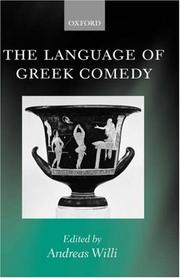
ISBN: 0199245479 0191714992 0191529699 9780199245475 Year: 2002 Publisher: Oxford ; New York Oxford University Press
Abstract | Keywords | Export | Availability | Bookmark
 Loading...
Loading...Choose an application
- Reference Manager
- EndNote
- RefWorks (Direct export to RefWorks)
Greek drama (Comedy) --- Language and culture --- Greek language --- Comédie grecque --- Langage et culture --- Grec (Langue) --- History and criticism. --- Style. --- Histoire et critique --- Style --- History and criticism --- Comédie grecque --- Greece --- Language and culture - Greece --- Greek language - Style --- Greek drama (Comedy) - History and criticism
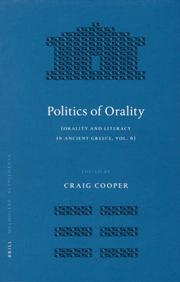
ISBN: 9789004145405 9004145400 9786611396718 1281396710 904740808X 9789047408086 9781281396716 6611396713 Year: 2007 Volume: 6 280 Publisher: Leiden : Brill,
Abstract | Keywords | Export | Availability | Bookmark
 Loading...
Loading...Choose an application
- Reference Manager
- EndNote
- RefWorks (Direct export to RefWorks)
This volume represents the sixth in the series on Orality and Literacy in the Ancient Greek and Roman Worlds. The present work comprises a collection of essays that explore the tensions and controversies that arise as a society moves from an oral to literate culture. Part 1 deals with both Homeric and other forms of epic; part 2 explores different ways in which texts and writing were manipulated for political ends. Part 3 and 4 deals with the controversies surrounding the adoption of writing as the accepted mode of communication; whereas some segments of society began to privilege writing over oral communication, others continued to maintain that the latter was superior. Part 4 looks at the oral elements of Athenian Law.
Greek literature --- Transmission of texts --- Oral communication --- Language and culture --- Oral tradition --- Littérature grecque --- Transmission de textes --- Communication orale --- Langage et culture --- Tradition orale --- History and criticism. --- Histoire et critique --- Oral transmission --- Speech communication --- Verbal communication --- Communication --- History and criticism --- Culture --- Greek literature - History and criticism. --- Transmission of texts - Greece. --- Oral communication - Greece. --- Language and culture - Greece. --- Oral tradition - Greece.
Multi

ISSN: 27407624 ISBN: 9782356680693 2356680691 2356681744 Year: 2021 Volume: 2 Publisher: Lyon : MOM Éditions,
Abstract | Keywords | Export | Availability | Bookmark
 Loading...
Loading...Choose an application
- Reference Manager
- EndNote
- RefWorks (Direct export to RefWorks)
L’usage de versions abrégées des œuvres littéraires de tous les domaines, de l’ouvrage de botanique à l’ensemble de l’œuvre d’un historien comme Tite-Live, est extrêmement courant dans l’Antiquité. Ces résumés ont des formes variées, qui vont des « sommaires » (periochae) à la sélection d’extraits (épitomé), en passant, entre autres, par la paraphrase ; l’absence de cadre théorique, dans le monde gréco-romain, explique une telle diversité. Les contributeurs de ce volume se sont intéressés à des cas particuliers de résumés antiques, en s’interrogeant sur les pratiques à l’œuvre dans des domaines précis : les ouvrages scientifiques et techniques (médecine, astronomie, histoire) et le contexte rhétorique et scolaire (poésie, commentaires scolaires). Ils observent, chez les Anciens, un usage surprenant, pour le scientifique moderne, du résumé. En effet certains savants, en Grèce et à Rome, au cours de la rédaction d’un ouvrage, n’hésitent pas à puiser dans des résumés, et non dans les œuvres intégrales, tandis que d’autres vont jusqu’à ajouter des éléments aux sources qu’ils abrègent, voire à « réinventer » l’œuvre qu’ils résument. Dans le contexte scolaire, les résumés ont un rôle particulièrement important, dont les épitomateurs anciens sont souvent parfaitement conscients : les suppressions et les modifications manifestent une attention particulière à tel ou tel lectorat et le résumé a ses propres enjeux dans la transmission de toutes les formes de littérature. The use of abbreviated versions of literary works from all fields of knowledge, from botany to the whole work of a historian such as Livy, was extremely common in Antiquity. These digests had various forms, ranging from “summary” (periochae) to the selection of abstracts (epitome), and passing by paraphrase; the absence of any theoretical framework, in the Greco-Roman world, explains such diversity. The contributors to this volume have been interested in studying specific cases of ancient abstracts, by…
Conferences - Meetings --- History, Ancient --- Civilization, Classical --- History --- Science, Ancient --- Language and culture --- Methodology --- History, Ancient - Sources - Congresses --- Civilization, Classical - Sources - Congresses --- History - Methodology - Congresses --- Science, Ancient - Sources - Congresses --- Language and culture - Greece - Congresses --- Language and culture - Rome - Congresses --- Classics --- Literature (General) --- résumé --- épitomé --- abrégé --- paraphrase --- poésie --- littérature scolaire --- médecine --- astronomie --- histoire --- summary --- epitome --- abstract --- poetry --- school litterature --- medicine --- astronomy --- Greece. --- Rome (Empire)
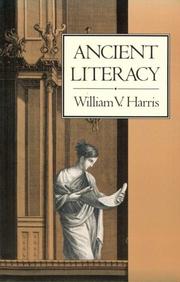
ISBN: 0674038371 9780674038370 9780674033818 0674033817 9780674033801 0674033809 Year: 1989 Publisher: Cambridge (MA) ; London : Harvard University Press,
Abstract | Keywords | Export | Availability | Bookmark
 Loading...
Loading...Choose an application
- Reference Manager
- EndNote
- RefWorks (Direct export to RefWorks)
How many people could read and write in the ancient world of the Greeks and Romans? No one has previously tried to give a systematic answer to this question. Most historians who have considered the problem at all have given optimistic assessments, since they have been impressed by large bodies of ancient written material such as the graffiti at Pompeii. They have also been influenced by a tendency to idealize the Greek and Roman world and its educational system. In Ancient Literacy W. V. Harris provides the first thorough exploration of the levels, types, and functions of literacy in the classical world, from the invention of the Greek alphabet about 800 B.C. down to the fifth century A.D. Investigations of other societies show that literacy ceases to be the accomplishment of a small elite only in specific circumstances. Harris argues that the social and technological conditions of the ancient world were such as to make mass literacy unthinkable. Noting that a society on the verge of mass literacy always possesses an elaborate school system, Harris stresses the limitations of Greek and Roman schooling, pointing out the meagerness of funding for elementary education. Neither the Greeks nor the Romans came anywhere near to completing the transition to a modern kind of written culture. They relied more heavily on oral communication than has generally been imagined. Harris examines the partial transition to written culture, taking into consideration the economic sphere and everyday life, as well as law, politics, administration, and religion. He has much to say also about the circulation of literary texts throughout classical antiquity. The limited spread of literacy in the classical world had diverse effects. It gave some stimulus to critical thought and assisted the accumulation of knowledge, and the minority that did learn to read and write was to some extent able to assert itself politically. The written word was also an instrument of power, and its use was indispensable for the construction and maintenance of empires. Most intriguing is the role of writing in the new religious culture of the late Roman Empire, in which it was more and more revered but less and less practiced. Harris explores these and related themes in this highly original work of social and cultural history. Ancient Literacy is important reading for anyone interested in the classical world, the problem of literacy, or the history of the written word.
Classical languages --- Literacy --- Civilization, Classical. --- Language and culture --- Culture and language --- Culture --- Classical civilization --- Civilization, Ancient --- Classicism --- Illiteracy --- Education --- General education --- Dead languages --- Languages, Classical --- History. --- Classical languages. --- Langues anciennes --- Langage et culture --- Alphabétisation --- 87 --- 930.85 --- 87 Klassieke literatuur --- Klassieke literatuur --- 930.85 Cultuurgeschiedenis. Kultuurgeschiedenis --- Cultuurgeschiedenis. Kultuurgeschiedenis --- History --- Greece --- Rome --- Civilization [Classical ] --- Language and culture - Greece. --- Language and culture - Rome. --- Literacy - Greece. --- Literacy - Rome.
Book
ISBN: 2707117684 9782707117687 Year: 1988 Publisher: Paris : La Découverte,
Abstract | Keywords | Export | Availability | Bookmark
 Loading...
Loading...Choose an application
- Reference Manager
- EndNote
- RefWorks (Direct export to RefWorks)
Books and reading --- Language and culture --- Literacy --- History. --- 028 --- 027 <37/38> --- 02 <09> <38> --- -Language and culture --- -Literacy --- -Illiteracy --- Education --- General education --- Culture and language --- Culture --- Appraisal of books --- Books --- Choice of books --- Evaluation of literature --- Literature --- Reading, Choice of --- Reading and books --- Reading habits --- Reading public --- Reading --- Reading interests --- Reading promotion --- Lezen. Lectuur --- Algemene bibliotheken--?<37/38> --- Bibliotheekwezen:--algemene geschiedenis--Oud-Griekenland --- History --- Appraisal --- Evaluation --- Greece --- Civilization. --- -Lezen. Lectuur --- 02 <09> <38> Bibliotheekwezen:--algemene geschiedenis--Oud-Griekenland --- 027 <37/38> Algemene bibliotheken--?<37/38> --- 028 Lezen. Lectuur --- -028 Lezen. Lectuur --- Illiteracy --- Books and reading - Greece - History. --- Language and culture - Greece. --- Literacy - Greece - History.
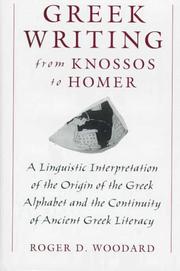
ISBN: 0195105206 0195355660 1280452722 0585381445 9780585381442 9786610452729 6610452725 9780195105209 0197704662 Year: 2023 Publisher: New York ; Oxford University Press,
Abstract | Keywords | Export | Availability | Bookmark
 Loading...
Loading...Choose an application
- Reference Manager
- EndNote
- RefWorks (Direct export to RefWorks)
Woodard examines the origin of the Greek alphabet and treats the advent of its script as a point on an unbroken continuum of Greek literacy. He argues that those who adapted the Phoenician script were scribes used to writing with the script of Cyprus.
Greek language --- Written communication --- Language and culture --- Literacy --- Alphabet --- History. --- Written Greek. --- Writing. --- 003.341 --- 003.341 Grieks schrift --- Grieks schrift --- Grec (Langue) --- Communication écrite --- Langage et culture --- Alphabétisation --- History --- Written Greek --- Writing --- Histoire --- Grec parlé --- Ecriture --- Written discourse --- Written language --- Communication --- Discourse analysis --- Language and languages --- Visual communication --- Illiteracy --- Education --- General education --- Culture and language --- Culture --- Classical languages --- Indo-European languages --- Classical philology --- Greek philology --- Alphabet. --- Greek language - Alphabet --- Written communication - Greece - History. --- Language and culture - Greece - History. --- Greek language - Written Greek. --- Literacy - Greece - History. --- Greek language - Writing.
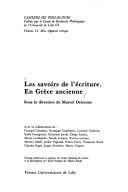
ISBN: 2859393226 9782859393229 Year: 1988 Volume: 14 Publisher: Lille : Presses universitaires de Lille,
Abstract | Keywords | Export | Availability | Bookmark
 Loading...
Loading...Choose an application
- Reference Manager
- EndNote
- RefWorks (Direct export to RefWorks)
Literacy --- Greek language --- Language and culture --- Alphabétisation --- Grec (Langue) --- Langage et culture --- History --- Writing --- Histoire --- Ecriture --- Greece --- Grèce --- Civilization --- Civilisation --- Written communication --- Written Greek --- 02 <09> <38> --- 091 =75 --- 091.14:003.341 --- -Greek language --- -Language and culture --- -Writing --- -Written communication --- -Written discourse --- Written language --- Communication --- Discourse analysis --- Language and languages --- Visual communication --- Chirography --- Handwriting --- Ciphers --- Penmanship --- Culture and language --- Culture --- Classical languages --- Indo-European languages --- Classical philology --- Greek philology --- Bibliotheekwezen:--algemene geschiedenis--Oud-Griekenland --- Handschriftenkunde. Handschriftencatalogi--Grieks --- Codices--Grieks schrift --- Writing. --- Written Greek. --- History. --- -Bibliotheekwezen:--algemene geschiedenis--Oud-Griekenland --- 091.14:003.341 Codices--Grieks schrift --- 091 =75 Handschriftenkunde. Handschriftencatalogi--Grieks --- 02 <09> <38> Bibliotheekwezen:--algemene geschiedenis--Oud-Griekenland --- Alphabétisation --- Grèce --- Written discourse --- Greek language - Writing --- Greek language - Written Greek --- Written communication - Greece - History --- Language and culture - Greece - History --- Writing - Greece - History --- Grece antique --- Vie intellectuelle --- Histoire ancienne
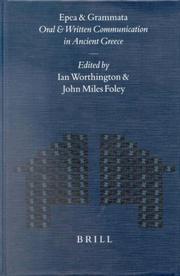
ISBN: 9004124551 9004350926 9789004124554 Year: 2002 Volume: 230 Publisher: Leiden : Brill,
Abstract | Keywords | Export | Availability | Bookmark
 Loading...
Loading...Choose an application
- Reference Manager
- EndNote
- RefWorks (Direct export to RefWorks)
This volume deals with aspects of orality and oral traditions in ancient Greece, and is a selection of refereed papers from the fourth biennial Orality and Literacy in Ancient Greece conference, held at the University of Missouri Columbia in 2000. The book is divided into three parts: literature, rhetoric and society, and philosophy. The papers focus on genres such as epic poetry, drama, poetry and art, public oratory, legislative procedure, and Simplicius’ philosophy. All papers present new approaches to their topics or ask new and provocative questions.
Greek literature --- Written communication --- Oral communication --- Oral tradition --- Language and culture --- Literacy --- Littérature grecque --- Communication écrite --- Communication orale --- Tradition orale --- Langage et culture --- Alphabétisation --- History and criticism --- History --- Histoire et critique --- Histoire --- Greek language --- History and criticism. --- Written Greek. --- Spoken Greek. --- -Greek language --- -Greek literature --- -Language and culture --- -Literacy --- -Oral communication --- -Oral tradition --- -Written communication --- -Written discourse --- Written language --- Communication --- Discourse analysis --- Language and languages --- Visual communication --- Tradition, Oral --- Folklore --- Oral history --- Oral transmission --- Speech communication --- Verbal communication --- Illiteracy --- Education --- General education --- Culture and language --- Culture --- Balkan literature --- Byzantine literature --- Classical literature --- Classical philology --- Greek philology --- Classical languages --- Indo-European languages --- Spoken Greek --- Written Greek --- -Spoken Greek --- Littérature grecque --- Communication écrite --- Alphabétisation --- Written discourse --- History. --- Greek literature - History and criticism. --- Written communication - Greece. --- Oral communication - Greece. --- Oral tradition - Greece. --- Greek language - Written Greek. --- Greek language - Spoken Greek. --- Language and culture - Greece. --- Literacy - Greece.
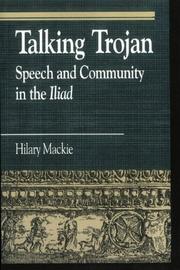
ISBN: 0847682552 0847682544 9780847682553 9780847682546 Year: 1996 Publisher: Lanham, MD : Rowman & Littlefield Publishing,
Abstract | Keywords | Export | Availability | Bookmark
 Loading...
Loading...Choose an application
- Reference Manager
- EndNote
- RefWorks (Direct export to RefWorks)
Language and culture --- Trojan War --- Speech in literature --- Community life in literature --- Culture conflict in literature --- Epic poetry, Greek --- Literature and the war --- History and criticism --- Homer --- Language --- Characters --- Trojans --- Troy (Extinct city) --- In literature --- -Language and culture --- -Trojan War --- -Culture conflict in literature --- -Speech in literature --- Culture and language --- Culture --- Mythology, Greek --- Greek epic poetry --- Epic poetry, Classical --- Greek poetry --- -Homer --- -Characters --- -Trojans --- -In literature --- -Hóiméar --- Hūmīrūs --- Homeros --- Homerus --- Gomer --- Omir --- Omer --- Omero --- Ho-ma --- Homa --- Homérosz --- האמער --- הומירוס --- הומר --- הומרוס --- هومر --- هوميروس --- 荷马 --- Ὅμηρος --- Гамэр --- Hamėr --- Омир --- Homero --- 호메로스 --- Homerosŭ --- Homērs --- Homeras --- Хомер --- ホメーロス --- ホメロス --- Гомер --- Homeri --- Hema --- Pseudo-Homer --- Pseudo Omero --- Homère --- Trojans in literature --- Homer. --- Trojans. --- Knowledge --- Language. --- In literature. --- Hóiméar --- Language and culture - Troy (Extinct city) --- Trojan War - Literature and the war --- Language and culture - Greece --- Epic poetry, Greek - History and criticism --- Homer - Language --- Homer - Characters - Trojans --- Troy (Extinct city) - In literature
| Listing 1 - 10 of 15 | << page >> |
Sort by
|

 Search
Search Feedback
Feedback About
About Help
Help News
News